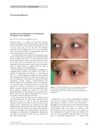 16 citations,
February 2017 in “Dermatology and Therapy”
16 citations,
February 2017 in “Dermatology and Therapy” The new visual scale is a quick and effective way to measure hair loss in women.
 16 citations,
April 2015 in “Lasers in Surgery and Medicine”
16 citations,
April 2015 in “Lasers in Surgery and Medicine” Using a fractional laser can stimulate hair growth, but the intensity and duration of inflammation are crucial. Too much can cause ulcers and scarring. Lower beam energy and fewer treatments are recommended to avoid damage.
 16 citations,
January 2007 in “Journal of Obstetrics and Gynaecology”
16 citations,
January 2007 in “Journal of Obstetrics and Gynaecology” The document suggests various treatments for PCOS, including medication for menstrual issues, insulin resistance, and excess hair, as well as fertility treatments, while highlighting the need for personalized care and lifestyle changes.
 16 citations,
January 2001 in “Clinical and Experimental Dermatology”
16 citations,
January 2001 in “Clinical and Experimental Dermatology” Photodynamic therapy was effective in treating multiple scalp basal cell carcinomas with minimal side effects and good cosmetic results.
 15 citations,
January 2017 in “Lasers in Surgery and Medicine”
15 citations,
January 2017 in “Lasers in Surgery and Medicine” Laser treatment improved scalp skin condition with no side effects.
 15 citations,
November 2009 in “Clinical and Experimental Dermatology”
15 citations,
November 2009 in “Clinical and Experimental Dermatology” Bimatoprost helped a girl grow her eyelashes back quickly and without serious side effects.
 14 citations,
June 2018 in “JAMA Dermatology”
14 citations,
June 2018 in “JAMA Dermatology” Trichoscopy is useful for diagnosing and monitoring hair and scalp conditions over time.
 13 citations,
January 2019 in “Colloids and Surfaces B: Biointerfaces”
13 citations,
January 2019 in “Colloids and Surfaces B: Biointerfaces” The new drug delivery systems made with surfactants and block polymers are stable and not toxic.
 13 citations,
March 2018 in “Journal of Sociology”
13 citations,
March 2018 in “Journal of Sociology” The anti-ageing treatment market is growing by exploiting fears of ageing with unproven promises, which could harm public trust and genuine science.
 13 citations,
December 2014 in “Stem Cells”
13 citations,
December 2014 in “Stem Cells” Hair and skin can regenerate without bulge stem cells due to other compensating cells.
13 citations,
June 2006 in “Fertility and Sterility” Nonclassic 21-hydroxylase deficiency is a common, treatable genetic disorder causing reversible symptoms like acne and hair loss.
13 citations,
July 2004 in “Pediatric dermatology” A new severe form of monilethrix syndrome includes hair loss, scalp itching, cataracts, and distinct facial features.
 13 citations,
May 1996 in “Archives of Disease in Childhood”
13 citations,
May 1996 in “Archives of Disease in Childhood” Siblings with signs of virilization should be tested for non-classical congenital adrenal hyperplasia, which does not affect adult height but may impact fertility and well-being if untreated.
 12 citations,
January 2021 in “Journal of Investigative Dermatology”
12 citations,
January 2021 in “Journal of Investigative Dermatology” Hair follicle studies suggest that maintaining telomere length could help treat hair loss and graying, but it's uncertain if mouse results apply to humans.
 12 citations,
January 2014 in “Cell structure and function”
12 citations,
January 2014 in “Cell structure and function” Different combinations of human hair keratins affect how hair fibers form.
 12 citations,
October 2012 in “International Braz J Urol”
12 citations,
October 2012 in “International Braz J Urol” Finasteride effectively and safely treats recurrent priapism in children and adolescents with sickle cell disease.
 12 citations,
September 2010 in “Clothing and Textiles Research Journal”
12 citations,
September 2010 in “Clothing and Textiles Research Journal” Poplar seed hair fibers could be an eco-friendly insulation for textiles.
 11 citations,
January 2018 in “Acta dermato-venereologica”
11 citations,
January 2018 in “Acta dermato-venereologica” Tofacitinib works better and is more tolerable for severe alopecia than conventional treatments and DPCP immunotherapy.
 11 citations,
August 2004 in “Facial Plastic Surgery”
11 citations,
August 2004 in “Facial Plastic Surgery” The endobrow-midface lift is a safe and effective way to rejuvenate the upper face with minimal complications and rare temporary hair loss.
10 citations,
September 2022 in “Journal of Biophotonics” Blue light therapy is safe for skin and may protect against UV radiation.
 10 citations,
November 2014 in “Journal of Dermatological Treatment”
10 citations,
November 2014 in “Journal of Dermatological Treatment” Polyphenols may help treat skin conditions like warts, hair loss, acne, and dark spots, but more research is needed.
 9 citations,
October 2018 in “Journal of Cosmetic Dermatology”
9 citations,
October 2018 in “Journal of Cosmetic Dermatology” Isotretinoin at a low dose for three months does not significantly affect hair growth.
9 citations,
February 2018 in “Journal of Patient-Reported Outcomes” New tools were created to help lupus patients report their symptoms and impacts more accurately.
 9 citations,
July 2014 in “Experimental Dermatology”
9 citations,
July 2014 in “Experimental Dermatology” PTHRP agonists can stimulate hair growth, especially in damaged follicles, while antagonists may initially increase growth but ultimately inhibit it.
 9 citations,
January 2005 in “Journal of Cosmetic and Laser Therapy”
9 citations,
January 2005 in “Journal of Cosmetic and Laser Therapy” In 2005, hair transplants looked natural and worked best with realistic goals, medication to preserve hair, and depended on the amount of donor hair.
 8 citations,
April 2021 in “Medical journal of the Islamic Republic of Iran”
8 citations,
April 2021 in “Medical journal of the Islamic Republic of Iran” Taking finasteride can partially improve oxygen levels in hospitalized male patients over 50 with COVID-19 pneumonia, but it doesn't affect other outcomes like death rate or hospital stay length.
8 citations,
January 2020 in “Indian Dermatology Online Journal” PRP works faster and is a safe alternative to steroids for treating alopecia areata.
 8 citations,
June 2019 in “Pharmaceutical research”
8 citations,
June 2019 in “Pharmaceutical research” Applying heat with certain chemicals can greatly improve how well isotretinoin gets into the skin through hair follicles.
 8 citations,
December 2017 in “Cancer Medicine”
8 citations,
December 2017 in “Cancer Medicine” Finasteride use may increase the risk of male breast cancer.
 7 citations,
May 2022 in “International Journal of Environmental Research and Public Health”
7 citations,
May 2022 in “International Journal of Environmental Research and Public Health” Isotretinoin therapy for acne can cause many reversible side effects, mainly mild skin conditions, and patient understanding of these effects can improve treatment adherence.

























